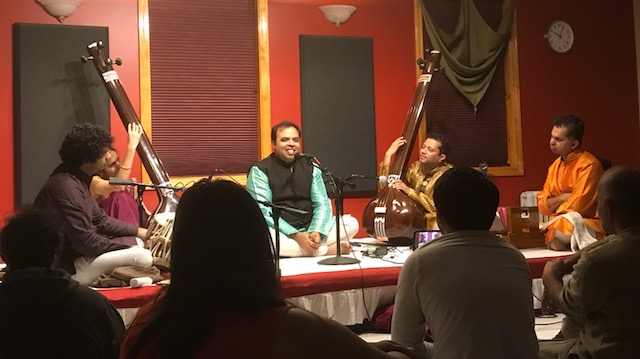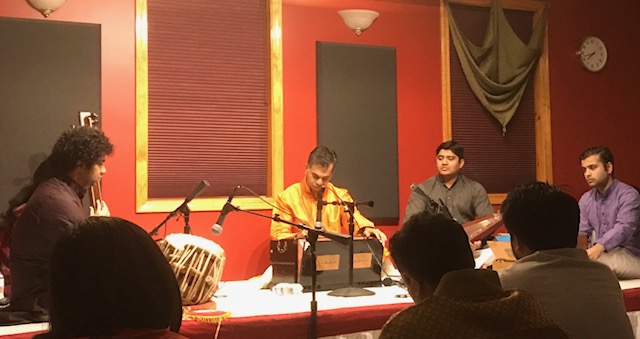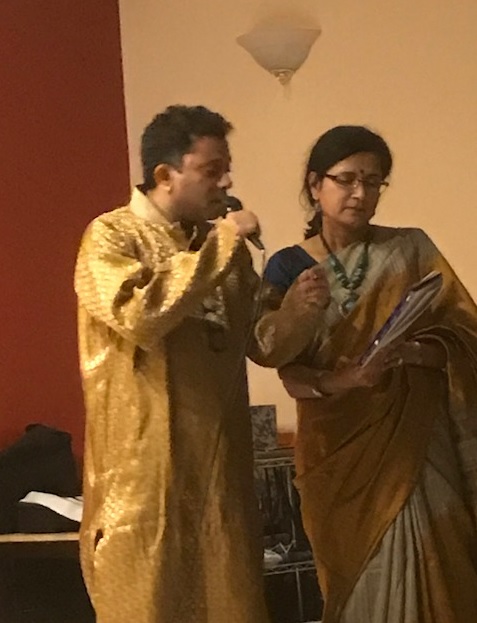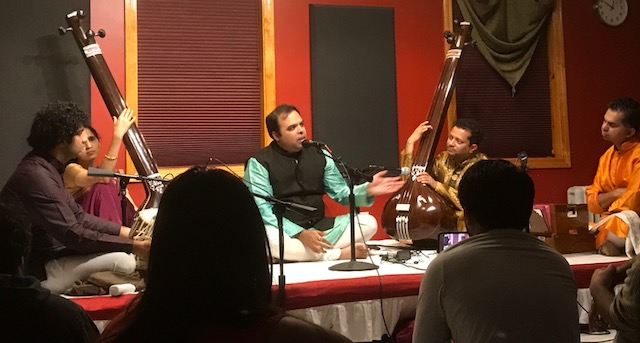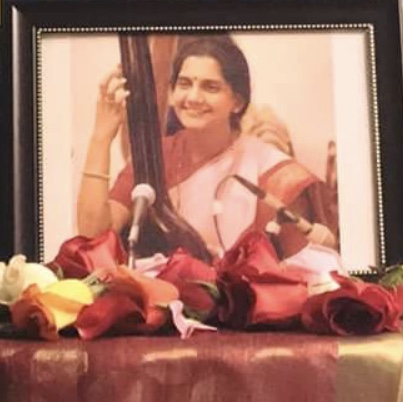Contribute
| Memorial Concert Touches Hearts Of Hindustani Classical Music Lovers |
Shuchita Rao
10/05/2017
A tribute concert was organized by Boston based vocalist and harmonium artist, Shri Ramachandra Joshi in memory of his Guru, the noted Hindustani classical vocalist, the late Vidushi Smt. Veena Sahasrabuddhe. Smt. Sahasrabuddhe suffered from a neurodegenerative disease PSP towards the end of her life and passed away on June 29, 2016 at the age of 67 years. The three hour long memorial concert held in Framingham on Saturday, Sep 30 at 7:30pm featured a harmonium solo recital and a vocal recital by visiting artists from New York, Shri Kedar Naphade and Shri Samarth Nagarkar respectively. Both artists were provided excellent accompaniment by Shri Amit Kavthekar on the tabla, Smt. Bhavana Gallewale and Shri Sagar Tayde on the tanpura. A portrait showing a smiling photograph of the late Smt. Veena Sahasrabuddhe, surrounded by colorful roses was placed to the left of the stage. Shri Joshi welcomed the artists and the audience along with another senior disciple, Smt. Asavari Maggirwar visiting from Rochester, NY. The two disciples sang a beautiful prayer dedicated to Lord Ganesha and briefly recounted details of their musical journeys with their Guru. “Veenatai was a very warm and sweet person. She was also very disciplined. She made us sing “Sa†for a long time until we got it right. She was open to the idea of learning a composition from younger musicians. Vocalist Sanjeev Abhayankar was atleast 25-30 years younger than her and after hearing him sing a composition at a music program, she called him the next day and said that she wanted to learn it from him. She was also generous with sharing her knowledge and never kept it to herself†said Smt. Maggirwar. Shri Ram Joshi adding to what his Guru-behen Asavari Maggirwar said “We live her music every day.†Smt. Veena Sahasrabuddhe was a prolific Hindustani vocalist with roots in the oldest gharana “Gwalior gharana†and won great acclaim for her renditions of khyals, taraanas and bhajans. She learned music under her father, Pandit Shankar Shripad Bodas as well as her brother, Pandit Kashinath Shankar Bodas. She won several awards including the coveted National Sangeet Natak Akademi Award and was recognized by the President of India. She trained numerous disciples of which her daughter-in-law, vocalist Smt. Jayanthi Sahasrabuddhe and her brother’s daughter-in-law, vocalist Smt. Rachna Bodas are devoted to carrying forward her musical legacy. New York based artist Shri Kedar Naphade, an eminent harmonium player who accompanied Smt. Sahasrabuddhe on most of her concerts in the United States talked about the encouragement he received from her that helped him blossom into a full-fledged artist. “When you are a student of music you always wonder if you will ever be able to call yourself an artist. There are students who spend 10-15 years before they feel they can call themselves artists. Veenatai made my dream of becoming an artist come true for me. Over the last twelve years, myself and Vivek Datar, based on the West Coast accompanied her on every single concert she had in the US†he said. Shri Naphade began his solo harmonium recital by presenting two compositions in the poignant Raga Puriya Dhanashri known for its powers to create the mood of “virah†or separation. The first was a traditional composition set to ten beat cycle jhaptaal and the second, a faster tempo composition by Shri Balwantrai Bhatt (Bhaav-Rang) was set to 14 beat cycle aada-chautaal, a favorite taal of Smt. Sahasrabuddhe. Shri Naphade’s young student Shri Rohan Prabhudesai who accompanied on a second harmonium played creatively when given an opportunity. Shri Naphade remembered his Guru Shri Tulsidas Borkar while presenting his next item, a Banaarasi Dhun. Inspired by Shehnai Nawaaz Ustad Bismillah Khan’s music, the “dhun†navigated multiple ragas and engaged with Shri Amit Kavthekar’s rhythm accompaniment in charming ways. Both the classical and semi-classical renditions showed Shri Naphade’s tremendous command on the harmonium and his ability to use of a variety of interesting techniques to showcase the instrumental approach to building a musical atmosphere. Shri Naphade, who spent several years as a teen listening to Smt. Sahasrabuddhe’s live concerts in Maharashtra, India concluded with the words “Veenatai knew my devotion to music despite the constraints of a full-time job. In many ways, she loved me like a son.†Shri Samarth Nagarkar was the next artist to take stage. Disciple of the Agra gharana stalwart, the late Shri. Dinkar Kaikini and currently under the tutelage of the renowned Gwalior, Jaipur and Agra gharana exponent Shri Ulhas Kashalkar, Shri Nagarkar spoke of how Smt. Sahasrabuddhe was one of his earliest influences in music. “Veenatai was a very big part of the musical atmosphere my parents created for us at my home. Her recordings of Mian Ki Malhar, Todi and Darbaari Kanada played on loop several hundred times as I was growing up. Later, in my teens, when 101 questions cropped up relating to academics and career issues, what she advised me in passing changed my life forever. She said she would love for me to pursue my interest in music to the greatest depth possible.†Shri Nagarkar shared that he had several opportunities to meet Smt. Sahasrabuddhe over the last few years and that he was honored to present a concert in her memory. “I am sad that this is a tribute concert. I wish she were here and we were singing in honor of her, celebrating what she has given us. We miss her dearly and I present my music as a humble offering today.†he added. Shri Nagarkar sang three compositions in Raga Kedar set to slow tempo fourteen beat Jhoomra taal, fast tempo sixteen beat cycle teentaal and yet another fast tempo composition set to twelve beat cycle ektaal. Endowed with a mellifluous voice, Shri Nagarkar exhibited great imagination in developing the raga in myriad pleasing ways, never losing sight of the notes of emphasis and anchoring firmly on bottom Khadaj, middle Pancham and upper tonic Shadaj. Crisp delivery of the two faster tempo compositions “Kanganwa mora†and “Sughar Chatur Baiyyan†accented by skillful play of the two varieties of madhyam, the sweeping use of musical ornament “meend†as well as modulated taan renditions showed Shri Nagarkar’s mastery on the khyal genre in ample measure. Exchanges with his accompanists, the harmonium played by Shri Naphade and with the tabla played by Shri Kavthekar were delightful. In fact, the three consummate artists with staunch faith in each other’s creative strengths made the rendition of the raga come alive. Shri Nagarkar concluded with an evocative Kabir Bhajan “Bhai santo aisa dhund andhiyaara†a composition in raga Saurashtra Maand with appealing forays into a variety of allied ragas. The bhajan was rendered with great emotion and it touched the hearts of the members in the audience. The memorial concert came to an end on a sombre note when the audience listened in complete silence and reverence to a melodious Bhairavi taraana recording of Smt. Veena Sahasrabuddhe. Audiences get to hear many music concerts in the Boston area but this was a special one because of the human touch added to it through the sharing of deeply felt personal experiences of artists in remembrance of an iconic classical musician of our times. While I never had an opportunity to learn directly from Smt. Veena Sahasrabuddhe, I am one of the scores of aspiring Hindustani performers who is deeply inspired by her music. Smt. Sahasrabuddhe will always stay in our minds and hearts for her genuine love for music, her beautiful vocal renditions and her total dedication to teaching music, a quality she imbibed from her father, Acharya Shri. S.S Bodas and older brother Shri. Kashinath Bodas. She carved a special place for herself in the world of Hindustani classical music and will certainly be remembered through her music and teachings for decades to come.
You may also access this article through our web-site http://www.lokvani.com/
